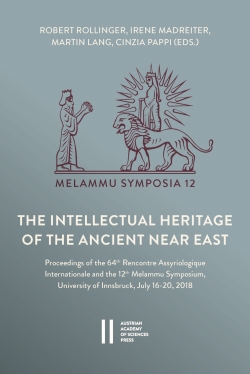
The Intellectual Heritage of the Ancient Near East, pp. 283-307, 2023/04/12
Proceedings of the 64th Rencontre Assyriologique Internationale and the 12th Melammu Symposium, University of Innsbruck, July 16‒20, 2018
Since Alexander’s campaign, poliorcetic details occur in Greek literature with scientific technical interest. The sparse former descriptions and illustrations of besiegement techniques in Archaic and Classical Greece are equally contrary to both the Hellenistic literature and the eloquent texts and pictures from the Mesopotamian context. Obviously, the Achaemenid empire in its tradition of the Assyrian and Babylonian kingdoms, transmitted this “Eastern” poliorcetic knowledge and practice to Greece. Against the background of experiences with Persian besiegement, Thucydides and Xenophon illustrate the increasing interest in the Greek literature. Last but not least, city sieges seem to be connected with constitutional and economic conditions: they are instruments of royal representation and military, economic and technical power made feasible by an adequate financial background.